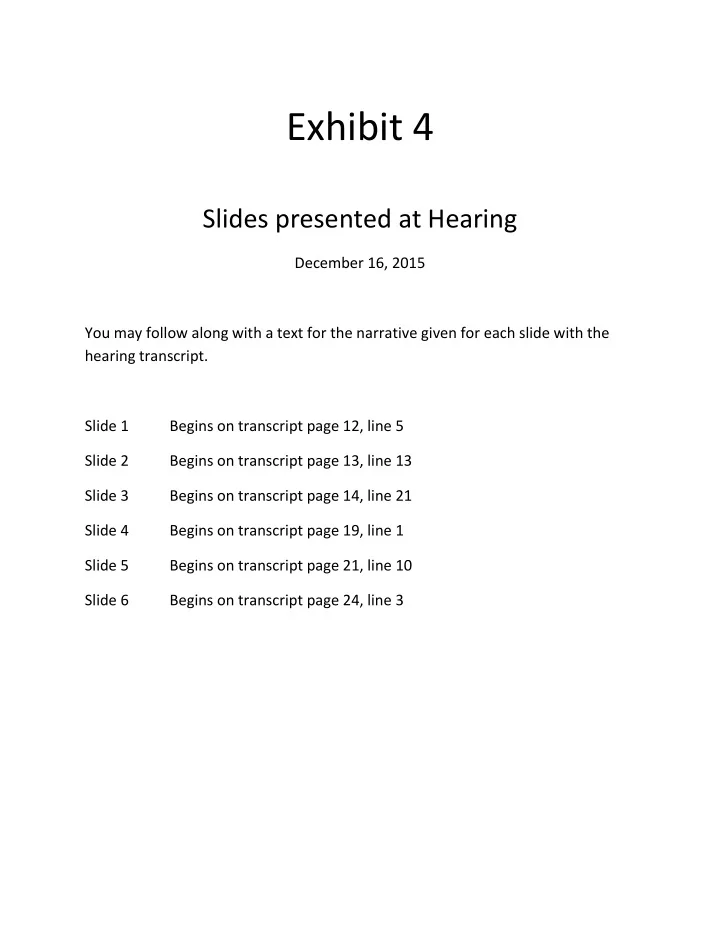

Exhibit 4 Slides presented at Hearing December 16, 2015 You may follow along with a text for the narrative given for each slide with the hearing transcript. Slide 1 Begins on transcript page 12, line 5 Slide 2 Begins on transcript page 13, line 13 Slide 3 Begins on transcript page 14, line 21 Slide 4 Begins on transcript page 19, line 1 Slide 5 Begins on transcript page 21, line 10 Slide 6 Begins on transcript page 24, line 3
SO 2 NAAQS (1-Hour) Nonattainment Areas: Cook/Will and Tazewell/Peoria Counties Attainment Demonstration Modeling for Illinois’ Revised Sulfur Dioxide State Implementation Plan Public Hearing - December 16, 2015 Illinois EPA Headquarters, Springfield, Illinois
Introduction Section 192(a) of the Clean Air Act - sets forth the requirement that the State Implementation Plan (SIP) is to “provide for attainment”. 40 CFR Part 51, Appendix W- has recommended “air quality modeling techniques that should be applied to State Implementation Plan (SIP) revisions”. Supplemental Modeling Guidance (e.g., Guidance for 1-Hour SO2 Nonattainment Area SIP Submissions , USEPA, April, 2014).
Modeling Framework, Inputs and General Methodology Modeling System: AERMOD and preprocessors Modeling Options: Regulatory defaults Modeling Inventory: Sources within 50 km of violating monitor Meteorology: Peoria/Lincoln; Chicago O’Hare/Davenport (IA) Receptor Network: 100 m spacing (fenceline 50 m spacing) SO 2 Background: Oglesby monitor Reduced Load Analysis: EGUs Building-Induced Downwash: Yes Rural vs Urban Dispersion: Rural Modeling Runs Iterative simulations with culpability determinations for identifying emission reductions necessary to achieve NAAQS.
Pekin NAA Modeling Scenarios Scenario 1: Maximum allowable emission limit (permit, rule). Scenario 2: Fuel oil sulfur content limits (15 ppm distillate, 1000 ppm residual, 500 ppm “exemption”); IPRG – E.D. Edwards Unit #1 retirement. Scenario 3: Aventine-specified emission rates; IPRG – E.D. Edwards and Midwest Generation – Powerton reductions (91% and 80%, respectively). Scenario 4: Reduction for Aventine #1 Germ Dryer; (MOA) IPRG – E.D. Edwards: Stack #1 – 2100 lbs/hr, Stack #2 – 2756 lbs/hr. Scenario 5: (MOA) IPRG – E.D. Edwards: Stack #1 – 0 lb/hr, Stack #2 – 4000 lbs/hr.
Lemont NAA Modeling Scenarios Scenario 1: Maximum allowable emission limit (permit, rule). Scenario 2: Fuel oil sulfur content limits (15 ppm distillate, 1000 ppm residual, 500 ppm “exemption”); Fuel conversion at Midwest Generation’s Joliet and Romeoville (Will County) facilities. Scenario 3: Owens Corning-specified emission reduction strategy; Ingredion, Inc. - lower limits for select sources. Scenario 4: Midwest Generation (Will County) Unit #4 emission limit lowered to 6520 lbs/hour; Ingredion, Inc. - Channel #2, #3, and #4 emission limits lowered. Scenario 5: Caterpillar, Inc. (Aurora) 500 ppm “exemption”. Scenario 6: Midwest Generation (Will County) Unit #4 emission limit set at 5000 lbs/hour.
Thank you . . . Jeffrey Sprague Modeling Unit, Manager Air Quality Planning Section Bureau of Air Illinois Environmental Protection Agency (217) 524-4692 Jeff.Sprague@Illinois.gov
Recommend
More recommend